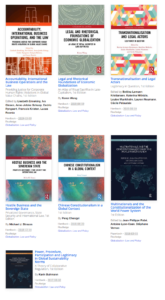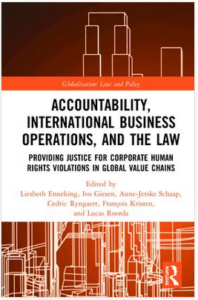I am the editor of a Book Series, Globalization: Law and Policy, for Routledge’s (Taylor and Francis Group). Here is the series description from the Ashgate website:
Globalization: Law and Policy builds an integrated body of scholarship that critically addresses key issues and theoretical debates in comparative and transnational law. Volumes in the series focus on the consequential effects of globalization, including emerging frameworks and processes for the internationalization, legal harmonization, juridification, and democratization of law among increasingly connected political, economic, religious, cultural, ethnic, and other functionally differentiated governance communities. Legal systems, their harmonization and incorporation in other governance orders, and their relationship to globalization are taking on new importance within a coordinated network of domestic legal orders, the legal orders of groups of states, and the governance frameworks of non-state actors. These legal orders engage a number of important actors, sources, principles, and tribunals – including multinational corporations as governance entities, contract and surveillance as forms of governance that substitute for traditional law, sovereign wealth funds and other new forms of state activity, hybrid supra national entities like the World Bank and the International Monetary Fund, and international tribunals with autonomous jurisdiction, including the International Criminal Court, the World Trade Organization, and regional human rights courts. The effects have been profound, especially with respect to the role of states, and especially of the United States as its long time position in global affairs undergoes significant change. Comparative and transnational law serve as natural nexus points for vigorous and sometimes interdisciplinary approaches to the study of state and non-state law systems, along with their linkages and interactions. The series is intended as a resource for scholars, students, policy makers, and civil society actors, and includes a balance of theoretical and policy studies in single-authored volumes and collections of original essays.
CLICK HERE FOR GLOBALIZATION : LAW AND POLICY SERIES PROPOSAL FORM: REVAshgate Proposal Guidelines–Globalization Series
 This is a young series with several very exciting projects in the works. Books published in the Series are shown below.More as they develop. If you are interested in submitting a manuscript, please consider Routledge Taylor & Francise and this series. I am happy to work with you.
This is a young series with several very exciting projects in the works. Books published in the Series are shown below.More as they develop. If you are interested in submitting a manuscript, please consider Routledge Taylor & Francise and this series. I am happy to work with you.
Accountability, International Business Operations and the Law
Providing Justice for Corporate Human Rights Violations in Global Value Chains, 1st Edition
Hardback – 2019-12-20
Routledge
Globalization: Law and Policy
-
Legal and Rhetorical Foundations of Economic Globalization
An Atlas of Ritual Sacrifice in Late-Capitalism, 1st Edition
Hardback – 2019-06-19
Routledge
Globalization: Law and Policy -
Transnationalisation and Legal Actors
Legitimacy in Question, 1st Edition
Hardback – 2019-06-14
Routledge
Globalization: Law and Policy-
Hostile Business and the Sovereign State
Privatized Governance, State Security and International Law, 1st Edition
Hardback – 2018-12-14
Routledge
Globalization: Law and Policy -
Chinese Constitutionalism in a Global Context
1st Edition
Hardback – 2018-08-20
Routledge
Globalization: Law and Policy -
Multinationals and the Constitutionalization of the World Power System
1st Edition
Paperback – 2018-05-11
Routledge
Globalization: Law and Policy -
Power, Procedure, Participation and Legitimacy in Global Sustainability Norms
A Theory of Collaborative Regulation, 1st Edition
Hardback – 2017-08-02
Routledge
Globalization: Law and Policy
-
Ashgate’s Globalization: Law and Policy series builds an integrated body of scholarship that critically addresses key issues and theoretical debates in comparative and transnational law. Volumes in the series focus on the consequential effects of globalization, including emerging frameworks and processes for governance. The series editor is Larry Catá Backer, from Pennsylvania State University, USA. He kindly answered some questions for us. Taylor & Francis Group was kind enough to publish a short interview about the series, reproduced below.
Taylor & Francis Group’s Globalization: Law and Policy series builds an integrated body of scholarship that critically addresses key issues and theoretical debates in comparative and transnational law. Volumes in the series focus on the consequential effects of globalization, including emerging frameworks and processes for governance. The series editor is Larry Catá Backer, from the Dickinson School of Law, Pennsylvania State University, USA. He kindly answered some questions for us.
What encouraged you to enter academia?
As long as I can remember I’ve wanted to understand human organization, to examine it the way an enthusiastic child examines a complex toy received as a gift from a relative with a perverse sense of humor. This sort of study permits the public satisfaction of private pleasure. The academic environment provides me an environment best suited to this pursuit, a space within which I can share my discoveries with the enthusiasm of a child who discovers of the way a complex plaything works or might be used.
What made you (decide to) initiate this series?
Innovative work tends to be lost in the great rush to produce the common. It is important not just to encourage the production of cutting edge work in an emerging area of law and policy, but to provide a space were work that might cut across disciplines might be supported. There is strength in numbers, and the elaboration of the related work of a community of scholars can strengthen their individual work and collectively provide a greater weight and influence for such efforts.
What are your academic background and research interests?
I started off my research by looking at the way governments use their power to manage and direct the way people think and behave. I was curious about the different roads to those similar ends taken under a variety of different theories of governance—democratic, theocratic and Marxist-Leninist—in their many variations. That led to a long-term effort to understand how different governance communities, states, corporations, religions, interest groups and others participate in and contribute to the governance of the individual. Globalization has both exposed and given great impetus to these governance modalities in new and transformative ways. I examine the institutionalization of governance within and beyond the state. My graduate studies at Harvard’s Kennedy School of Government and Columbia University really helped prepare me for this sort of interdisciplinary research agenda. My CV is available on my personal website.
Very briefly, where do you see your discipline going in the future?
In the 19th century, nation-states, standing at the pinnacle of their power, looked to each other to create a community of states and deployed a set of common idioms for that purpose. In the 20th century, having survived the worst excesses of the deployment of the power of the state system, this community of states sought to create a system for the management of the worst of their behaviors. In the 21st century states and their domestic legal orders will not be able to maintain their isolation from the emerging non-national governance frameworks and retain a substantial relevance; to avoid irrelevance, states and their law systems must recognize governance polycentricity and more effectively communicate with the emerging extra-legal governance frameworks of public and private governance systems and by public and private actors. It is that dynamic element of inter-systemic harmonization and its challenges for the law-state that this series is meant to explore.
What has been the highlight of your academic career so far?
There are three: the first was participating in the development of a School of International Affairs here at Penn State University; the second was participating in the important work of developing global norms for business and human rights; and the third was the establishment of my blog, Law at the End of the Day.
What book (not from the series but generally) has most influenced your own work?
I don’t know if influence is the right word, but Robert Musil’s Der Mann ohne Eigenschaften (The Man Without Qualities) (1930) has had the most profound effect on how I see the world.
What do you find particularly interesting about your role as series editor?
What I appreciate most about my role as series editor is the ability to encourage innovative work that explores law and governance in their systemic aspects within the current context of globalization. I especially appreciate the possibility that this series provides to aggregate and leverage the power of new and exciting scholarship to contribute to and strongly influence the policy and governance debates taking place now not only within academic circles but among leading civil society actors, government officials and corporate managers. In order to have a voice in the great issues of governance that confront state and non-state actors today, and that are vital to the forward movement of academic research, it is necessary to create and advance communities of discourse. This series is meant to contribute in some way to those efforts.
Any advice for people wanting to publish in your series?
First, don’t be shy: self-censorship, especially in the development of ideas that may not be embraced by a majority of our academic and policy peers is no reason to avoid pursuing insights to their reasonable ends. Second, avoid instrumentalism: good scholarship avoids both the great strengths and weaknesses of old fashioned pamphleteering grounded in the bending of words to a pre-conceived ends, let the scholarship take you where it leads rather than lead your scholarship to a deliberate end.
What was the last book you read?
The Infinity of Lists by Umberto Eco (2009). The ideology and expression of the unquenchable thirst for cataloging things, people, ideas, actions and the like, and through that cataloguing to determine the order of things, provides a great window on the human condition.









